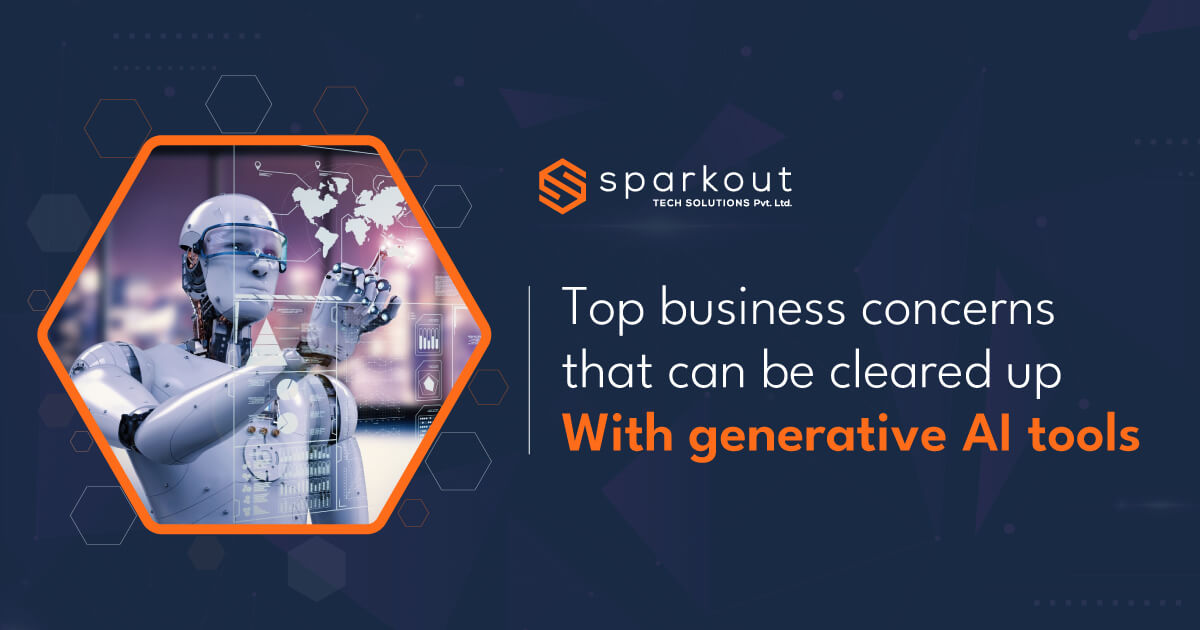Generative AI has become a buzzword in the tech world recently. It refers to programs that can use existing content such as text, audio files, or images to create new content. According to IBM's 2022 Global AI Adoption Index, generative AI has entered the business world, with a remarkable 35% of companies incorporating it.
This rapidly evolving field is revolutionizing business operations by enabling companies to solve complex problems. It enables computers to learn the underlying pattern associated with the input and then use it to generate similar content. According to a report, 30% of manufacturers will increase product development efficiency by 2027. Generative AI in 2022 has many applications that have emerged as a savior in various fields.
Generative AI tools, including ChatGPT, analyze large volumes of data to generate exclusive insights that traditional methods fail to deliver promptly. From content creation automation to supply chain optimization and improved customer service, generative AI for business has far-reaching implications. By combining machine learning and natural language processing, generative AI tools enable businesses to make better-informed decisions, optimize their operations, and increase their profits.
Applications of generative AI allow the production of novel and realistic visual, text, and animated content in minutes. According to Gartner, by 2025, the percentage of data generated by generative AI will account for 10% of all generated data. In this blog, you will see some of the complex problems that generative AI solves. So, let’s dive in!
1. Simplifying Customer Service
Customer service is a crucial area where generative AI tools like ChatGPT can solve complex business issues. Chatbots powered by ChatGPT can supply customers with fast and accurate responses to their questions and enhance the prevalent customer experience. Customers can also be given tailored advice based on their purchase history and preferences.
For example, a retailer powers ChatGPT to build a chatbot that helps customers find products, answer inquiries, and process orders. Chatbots can be programmed to recognize and resolve customer objections and issues to provide timely solutions and customer happiness.
Also, a healthcare provider brawniness deploys a ChatGPT-powered chatbot that can assist patients in organizing appointments, deliver details about medical practices, and answer health-related queries. This may help healthcare providers simplify their processes, decrease wait times, and enhance patient results.
- Social listening and ticketing
- Intelligent call routing
- Call classification
- Call intent discovery
- Voice authentication
- Customer service response suggestions
- Chatbots
- Call, survey, review analytics
- Customer contact analytics
- Self-service solutions
2. Efficient HR processes
Artificial intelligence tools like ChatGPT can significantly support corporate HR functions. Via natural language processing and machine learning methods, ChatGPT can automate redundant HR tasks while delivering precise and quick responses to staff queries.
For example, companies can leverage the ability of generative AI to make a virtual HR assistant. This virtual assistant can assist employees with tasks like organizing leaves, delivering benefits, and instructing new employees on the company. Moreover, the chatbot can offer tailored employment product suggestions to employees based on their skills and goods, thereby enhancing employee concentration and retention.
Additionally, ChatGPT can find qualified candidates for vacant positions and schedule interviews to back up skills by scrutinizing resumes and job descriptions. It will help HR departments to save time and increase the quality of recruitment.
- Hiring
- Building management
- Employee monitoring.
- HR analytics
- Retention management
- Digital assistant
- Performance management
3. Data Analytics with Generative AI
Generative AI technology in enterprises offers a considerable advantage in data analytics by discovering hidden patterns and trends that elude human perception. AI's ability to uncover such insights allows businesses to identify new areas of growth, optimize operations, and increase the satisfaction of their customers.
Generative AI's sentiment analysis capabilities serve as a great use case in data analytics. Generative AI tools like ChatGPT can analyze social media data to identify consumers' attitudes toward a brand, product, or service. Businesses can leverage the benefits of generative AI with this information. With the help of this data, they can refine their marketing strategies, develop a deeper understanding of customers, and increase customer satisfaction.
Additionally, generative AI tools can analyze large amounts of data and detect potential vulnerabilities. Such analytical insights offer businesses using generative AI the ability to proactively identify and address potential problems before they escalate.
- Data integration
- Data visualization
- Data management and monitoring
- Data preparation platform
- Data cleaning and validation platform
- Data transformation
- Synthetic data
- Data labelling
4. Enhance Sales
Many organizations use generative AI for the success of their business to increase their sales. Generative AI is gaining importance in the business world as a means to increase sales and remain competitive. A specific application of this technology involves the use of generative language models to create personalized product descriptions that meet customers' individual needs and preferences. Through analysis of customer data and behavior, generative AI can create unique and compelling narratives.
Another way to put generative AI technology to good use in business is price optimization. By analyzing market trends, consumer behavior, and competitors' prices, generative models can generate appropriate prices for products or services. It allows businesses to maximize revenue while providing value to customers.
Also, companies that need help with customer segmentation and targeted marketing campaigns can use generative AI for business. By scrutinizing customer data, generative models can discover patterns and create targeted campaigns that appeal to specific customer segments.
- Sales chatbot
- Customer sales contract analytics
- Sales call analytics
- Sales attribution and contributions
- Sales data automation
- AI-based agent coaching
- Predictive sales scoring
- Personalized marketing
5. New Product Innovations
New product development is another substantial use of generative AI for business. Developing innovative products and accelerating the design process can be complex business problems for many corporations. However, there are creative methodologies to deal with these obstacles, one of which is through the use of artificial intelligence systems.
By exploiting AI, enterprises can quickly examine large amounts of data and produce optimized designs based on specific parameters. Which will significantly reduce the duration and cost of product development while ensuring quality and performance.
For example, in the manufacturing industry, AI-powered design tools can scrutinize various design constraints such as weight, strength, and material usage to create optimized designs for products such as car parts, aircraft components, and more. Therefore, new product development is one of the most exciting generative AI business use cases.
6. Unique Content Creation
Developing high-quality content is one of the crucial part and time-consuming tasks in the corporate world, whether it's product reports, promotional materials, or even complete articles. Companies can leverage generative AI technology in business in such cases to make acceptable quality content within a fixed time.
Using technologies like natural language processes and machine learning algorithms, generative AI tools can assess existing ranges and develop new, high-quality content that fulfills distinct criteria. This may contain references such as tone, style, and target audience.
In complement to saving time and resources, this method will increase the overall quality and consistency of content. This is particularly helpful in sites like e-commerce where product definitions and reviews play a crucial role in driving sales.
7. Fraud Detection
Companies gear up their business by implementing generative AI tools to solve complex fraud detection problems. These tools are powerful for proactively detecting and preventing more fraudulent activities.
One beneficial application of using generative AI for business is in the field of fake ID document identification. These tools also rapidly scan identity documents like passports, driving licenses, and more to prevent fraudulent activity.
Additionally, companies can use AI-powered tools to identify payment fraud. These tools scrutinize payment data, identify suspicious transactions or patterns, and empower businesses to take appropriate action and prevent fraudulent activity.
Another area where AI-powered fraud detection tools can serve is fake accounts detection. These tools scrutinize user behavior and data to detect fake accounts and prevent them from accessing the platform or initiating fraudulent transactions. Generative AI technology in business offers fraud detection systems that can protect your firm and customers from financial loss and reputational damage.
Bullet Key Benefits of Generative AI for Business
- Virtual assistance and chatbots
- Content enhancement
- Creativity and innovations
- Problem-solving
- Research and explorations
- Personalization
- Content generation
- Enhanced decision making
- Tasks automation
- Fast content repurposing
Wrapping Up
Generative AI has various use cases for optimizing business operations. It can be used to automate workflows, create innovative products or services, optimize marketing campaigns, and predict trends. The benefits of using generative AI in business are plentiful, as it can increase efficiency, productivity, and accuracy, save costs, and open up new revenue streams.


CO-Founder
Yokesh Sankar, Co-Founder and Chief Operating Officer of Sparkout Tech Solutions, leverages his expertise to drive innovation and operational excellence in the software industry. Passionate about empowering individuals with essential skills, he uses technology to streamline business processes and enhance efficiency. He advocates for AI and blockchain adoption, helping businesses integrate these technologies seamlessly into their operations. Staying ahead of AI trends, Yokesh explores industry applications and shares insights to foster growth and knowledge in the tech sector.